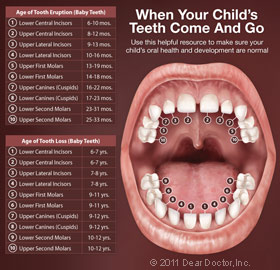Teething
At Pediatric Dental Associates, we believe everyone deserves a beautiful, healthy smile. That's why we strive to design high-quality, personalized treatment plans that place an emphasis on cultivating healthy dental development, helping our patients grow into a beautiful smile that lasts a lifetime. But we don't just want to provide dental treatments and services - we also want to be a resource to you for navigating the stages of your child's dental development. And unfortunately, no stage is more harrowing – and exciting – than teething.
Your Child's First Baby Teeth
Parents often think of the teething period with a potent mixture of excitement and anxiety: the first tooth is one of the most obvious and exciting milestones of your child's growth, but it signals the beginning of a period that often comes with crankiness, irritability, and meltdowns that occur for seemingly no reason. But with the right knowledge and careful planning, you can make the teething process easier for yourself and your baby.
You can expect to see your child's first teeth when they're between 6-9 months old. The lower front teeth usually erupt first, followed by the upper front teeth and the remaining 20 primary teeth over the next few years. All 20 teeth will usually erupt by age 3.
But in addition to the visible teeth, there are other ways you'll know your baby is teething. Some of the most common signs of teething include:
Common signs that your baby is teething include:
- Irritability
- Biting and gnawing
- Drooling
- Chin rash (caused by excessive salivation)
- Swollen gums
- Ear rubbing
- Decreased appetite
- Disrupted sleep patterns
You'll likely see an uptick in these patterns about four days before the eruption of a new tooth, and they'll continue for about three days after the tooth first appears. You may also see an "eruption cyst," which is a small, fluid-filled bubble that forms over the erupting tooth. Don't worry about these, as they'll pop naturally when the tooth fully erupts. Some say that diarrhea, rashes, and fever are signs of teething, but this is unlikely - in reality, it's probably a sign of another problem. If your baby experiences these issues, you should take them to your pediatrician.
Relieving Tooth Pain
Teething babies get the most relief from cold and/or pressure on the affected area. This can be applied with:
- Chilled teething rings
- Cold, wet washcloths
- Chilled pacifiers
- Massaging baby's gums
Never actually freeze a teething ring, as the intense cold can damage the gums. Never use whiskey or alcohol to "soothe" gums, as this does damage the the mouth and doesn't provide relief. You may also try over-the-counter remedies, but always check with a pediatrician or pharmacist. Avoid numbing agents unless they're prescribed by a physician.
Contact Us
The teething period comes with a unique set of challenges and surprises, but with care and planning, it doesn't have to be the "terrible twos" it's known as. If you have more questions about caring for your baby during teething, their dental development in general, or you want to bring them in for an appointment, we're always here to help. We can't wait to hear from you, and we wish you luck in navigating all the joys and challenges of teething!
More Services
Contact
We are always happy to answer any questions that you may have. Pediatric Dental Associates looks forward to welcoming your child into our children's dental care family!
